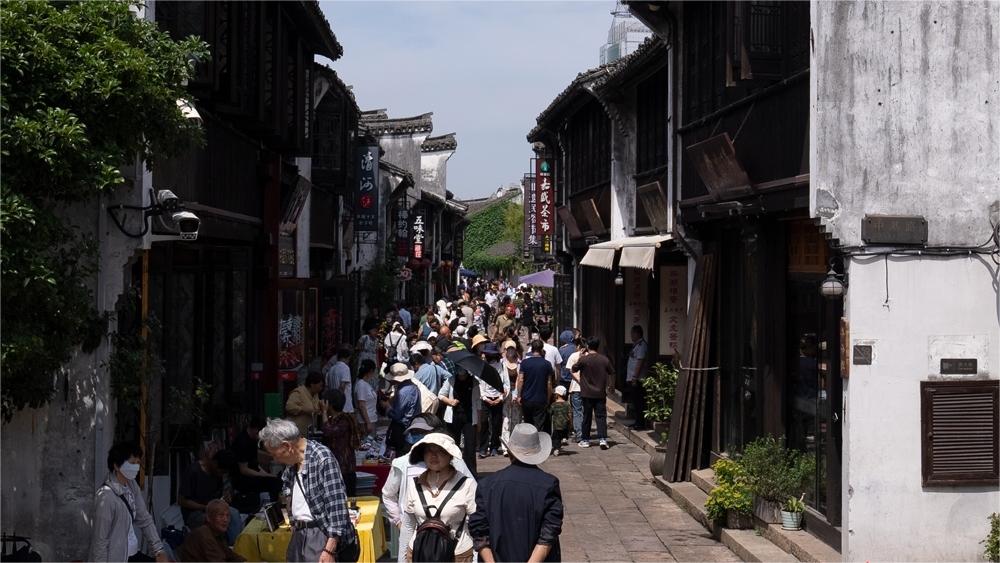Xi Story: An inspirer for sci-tech workers
BEIJING, May 30 (Xinhua) -- British chemist David Evans cherishes a necktie adorned with Chinese characters representing chemical elements. The distinctive accessory not only reveals his passion for science but often reminds him of the moment when he met Chinese President Xi Jinping.
Four years ago, at a Spring Festival reception in Beijing, the Chinese president noticed Evans' tie while shaking hands with him. Xi said to Evans, "I can guess your profession. We could have been fellows, (because) I studied chemical engineering (at university)."
Evans, a professor at Beijing University of Chemical Technology, was pleasantly surprised to learn of the Chinese president's academic background at Tsinghua University in the 1970s.
But what amazed him even more was Xi's speech at a symposium attended by scientists in September 2020, in which a lot of scientific knowledge, principles, and historical facts were cited.
"I have rarely seen a state leader having such an ability to engage in an in-depth discussion of scientific logic and laws," said Evans.
Noting that the key to Chinese modernization lies in science and technology, Xi has shown a keen interest in frontier areas. He is no stranger to the world of cutting-edge advancements, and concepts like AI, quantum, and self-driving technology dot his speeches. During his inspection visits nationwide, he has visited research institutions and sci-tech enterprises, and is often seen checking out the latest gadgets at tech exhibitions.
He also has deep respect for heroes behind the country's numerous sci-tech breakthroughs.
While presenting top national awards to wheelchair-bound scientists, or hosting video calls with orbiting taikonauts, he expresses care for the people at the forefront of the nation's innovation.
Before the launch of the Shenzhou-10 manned spaceship in 2013, Xi requested that sticky rice dumplings be added to the spaceship pantry so that the orbiting crew could celebrate Dragon Boat Festival in space, like what they do at home on Earth.
In addition to ensuring that all contributions are acknowledged and celebrated, Xi has made it his mission to alleviate the burdens of scientists and engineers and address any problems they face.
In May 2021, when addressing a meeting of academicians and sci-tech worker representatives, he highlighted the efforts on management reform in the sci-tech field, such as freeing sci-tech workers from formalistic and bureaucratic activities and abolishing the outdated evaluation criteria for talent that solely focused on papers, certificates or awards. Instead, he proposed a new evaluation system that was based on innovation, ability and contribution.
Recognizing the financial pressure that they often face, he advocated granting scientists greater decision-making power over technical routes and the use of funds.
Sci-tech workers, who celebrate the eighth National Science and Technology Workers' Day on May 30, have benefited from improved working conditions and increased government support as they strive for innovation.
Over the past decade, China has seen a significant boost in funding for research and development, which rose from 1 trillion yuan (about 140 billion U.S. dollars) in 2012 to 3.09 trillion yuan in 2022. As an important indicator measuring sci-tech manpower input, the number of full-time equivalent R&D personnel in China increased from 3.247 million in 2012 to 6.354 million in 2022.
Xi has also paid particular attention to foreign scientists, especially those from developing countries, who are committed to sci-tech exchanges and cooperation with China.
Last year, he replied to a letter from renowned Cuban scientist Pedro A. Valdes-Sosa, whose team in China chalked up great progress in brain science research and China-Cuba neurotechnology cooperation.
Xi expressed the hope that China-Cuba cooperation in various fields including science and technology could continue in the new era and better benefit the people of the two countries.
The Chinese president's encouragement for international sci-tech collaboration is reflected in many initiatives. China's top science awards are now open to foreign candidates; the Belt and Road Initiative has supported thousands of young foreign scientists to engage in scientific research and academic exchanges in China; and the country's space missions are made available for foreign scientific research payloads.
"We are striving to extend the benefits of scientific and technological innovation to more countries and people," Xi once said.
Photos
Related Stories
- Xi urges greater efforts to build China-Arab community with shared future
- Xi holds talks with UAE president
- Highlights: President Xi's keynote speech at the opening ceremony of the 10th ministerial conference of the China-Arab States Cooperation Forum
- Xi meets Sisi as China, Arab countries to hold conference
- Full text: President Xi's keynote speech at the opening ceremony of the 10th ministerial conference of the China-Arab States Cooperation Forum
Copyright © 2024 People's Daily Online. All Rights Reserved.









